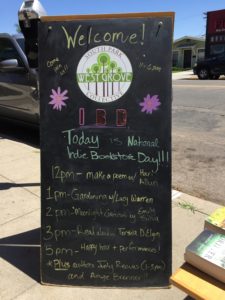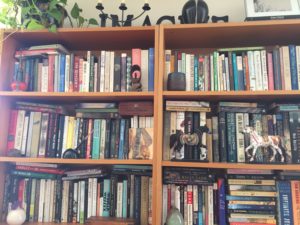 Yesterday I celebrated Indie Bookstore Day at West Grove Collective in South Park where owner Anne Mery invited me to be “soothsayer” for the day, using Bibliomancy as our oracle.
Yesterday I celebrated Indie Bookstore Day at West Grove Collective in South Park where owner Anne Mery invited me to be “soothsayer” for the day, using Bibliomancy as our oracle.
Bibliomancy is a form of divination in which insights are sought by randomly selecting a passage from a book and interpreting its message. Bibliomancy is also known as stichomancy—divination by lines of verse in books and compares with rhapsodomancy—divination from a random passage from a poem or ode.
Bibliomancy has been in practice for over 3000 years. Ancient Greeks used Homer’s Iliad or Odyssey for guidance. In the middle ages, Virgil’s Aeneid was a popular choice. The I Ching and the Bible also have been used in the practice.
Like other forms of divination or “fortune telling,” Bibliomancy is an art, not a science. Meanings and interpretations rest solely with the reader.
Here’s how you practice Bibliomancy:
Before you select the book you’ll consult, consider what question you want to ask. Rather than looking for a “yes” or “no” answer, allow your question to be more open-ended. For example, rather than asking, “Should I take that new job?” let your question be more of an exploration, “What should I consider about taking that job?”
1. Select Your Book
 Wander the bookstore or your own bookshelves and let your intuition be your guide—choose a book that feels “right” and connects with your emotions about the kind of guidance you’re seeking. A novel? A book about travel? A cookbook? A book of poetry? A children’s book? Trust your higher-self and let the many and varied books on display or on your shelves speak to you.
Wander the bookstore or your own bookshelves and let your intuition be your guide—choose a book that feels “right” and connects with your emotions about the kind of guidance you’re seeking. A novel? A book about travel? A cookbook? A book of poetry? A children’s book? Trust your higher-self and let the many and varied books on display or on your shelves speak to you.
2. Be Still
Hold your book without opening it, just let it be in your hands. Close your eyes if you wish to become still and centered. When you feel ready, ask your question. You may ask it aloud or in your mind. You may want to repeat the question. Take a few moments, allowing your question to resonate and be heard.
3. Find Your Message
Close your eyes and let your fingers wander through the book’s pages, touching the paper anywhere you like. When you feel the “right” place to stop, place your finger on the spot you’re drawn to. Another method: with eyes closed, hold the book by its spine and let it fall open, then allow your finger to wander the page you’ve opened to and find the passage.
4. Read
Read from where your finger is resting— a line, a paragraph or passage, or to the end of the page. You may want to read the line previous to the one your finger indicates, if it seems relevant.
5. Listen for the Wisdom
At first the words may seem to have no relation to the question you have asked. But don’t be in a rush to judge or dismiss. Repeat the passage or write it down. Be with the words and let their meaning take shape; don’t look for a literal answer. Intuitive information is often hidden in symbols, in deeper meanings.
What is your emotional response to the words? Do they offer guidance or inspiration? Do they spark a memory or an image? Consider any symbols such as numbers or references to nature or animals or archetypal images.
If you need more clarity, read the selected passage aloud or read the entire passage to help shed light on your question. If you’re still unsure, try again from the beginning. Select a book that seems to fit your question, go through each step, then merge the new answer with the last passage.
Any meanings or wisdom or guidance you may receive from a book, or from the Tarot or the I Ching or any other form of divination, ultimately depends upon your own interpretation and intuition. No one can predict your future; oracular readings are more about insights into a question or wondering.
What about you? Have you ever sought wisdom through the practice of Bibliomancy?

my search was for how to write my life story without making anyone look bad. I found this in Bird by Bird by Anne Lamott
As soon as you start protecting your characters from the ramifications of their less than lofty behavior, your story will start to feel flat and pointless, just like in real life.
Count on Anne Lamott to give us just the answer we writers need. Thanks for telling me about your experience, Annie.
Thanks for this Judy……..This seems similar to the Benedictine practice of Lectio Divina ( Latin for Divine Reading ) where monks undertake scriptural reading in order to enter communion with God. Four seamless stages are laid out: ONE/
Slowly and mindfully reading the text. TWO/ Active reflection on the meaning. THREE/ Undertaking meditation/prayer to explore the depth of feeling elicited. FOUR/ Contemplating its possible impact in our lives.
Yes, Michael, very similar. Though the practice of Bibliomancy precedes the printing of the Bible by some time, that text came to be consulted often by believers searching for spiritual wisdom and messages, and still today. Linda G. commented below that she regularly does this. Thanks for telling me about this practice, and giving it a name.
In all honesty I have as I say no patience for slow and mindful so I just ask straight across for answers in any case. However in contradiction to what I just said, it is common for me to look up without meaning to from any book and ponder the story. The practice works so well because it incorporates each of the strategies of NLP (neurolinguistic programming) so that we see and hear internally what we walk (read) through.
You are a woman of contradictions, Linda. Anyhow, however it works, let’s do it that way.
Fun!
It really is fun, Barb. And sometimes so surprisingly intuitive in providing just the response we need. I’ve seen it happen again and again.
Hi Judy,
I follow the Bible and having no patience I just ask the Lord and wait for the answer. Sometimes I wait a LONG time because I asked for patience and was taken seriously.
So I guess you would say I practice Bible-mancy.
Hi Linda,
Actually, for a time, the Bible was the primary source book for Bibliomancy explorations and wisdom-seeking.
How fun! I can’t wait to try it. Thanks, Judy
Let’s do this together, Jill. Your one of my favorite partners in exploring the realms.